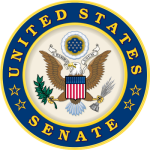- Domeniu: Government
- Number of terms: 4127
- Number of blossaries: 0
- Company Profile:
The United States Senate is the upper house of the United States Congress. The composition and powers of the Senate are established in Article One of the U.S. Constitution. Each U.S. state is represented by two senators, regardless of population. Senators serve staggered six-year terms.
Authority to veto part rather than all of an appropriations act. The President does not now have item-veto authority. He must sign or veto the entire appropriations act. The item veto sometimes is referred to as a line-item veto.
Industry:Government
The status given Senators according to their length of service, which entitles a Senator with greater seniority to preferential treatment in matters such as committee assignments.
Industry:Government
A law that establishes or continues one or more Federal agencies or programs, establishes the terms and conditions under which they operate, authorizes the enactment of appropriations, and specifies how appropriated funds are to be used. Authorizations acts sometimes provide permanent appropriations.
Industry:Government
Informal term for a period of delay required by rule. For example, when a bill or other measure is reported from committee, it may be considered on the floor only after it "lies over" for one legislative day and after the written report has been available for two calendar days. Layover periods may be waived by unanimous consent.
Industry:Government
Any matter on which the Senate is to vote, such as passage of a bill, adoption of an amendment, agreement to a motion, or an appeal.
Industry:Government
A temporary interruption of the Senate's (or a committee's) business. Generally, the Senate recesses (rather than adjourns) at the end of each calendar day.
Industry:Government
The Majority Leader and Minority Leader are elected by their respective party conferences to serve as the chief Senate spokesmen for their parties and to manage and schedule the legislative and executive business of the Senate. By custom, the Presiding Officer gives the floor leaders priority in obtaining recognition to speak on the floor of the Senate.
Industry:Government
Senate Rule XXVI requires that, when a committee (other than the Appropriations Committee) reports a measure, committee members may have three days to file statements providing their views on the measure which will be included in the committee's written report.
Industry:Government
Cumulative amounts borrowed by the Treasury Department or the Federal Financing Bank from the public or from another fund or account. The public debt does not include agency debt (amounts borrowed by other agencies of the Federal Government). The total public debt is subject to a statutory limit.
Industry:Government
